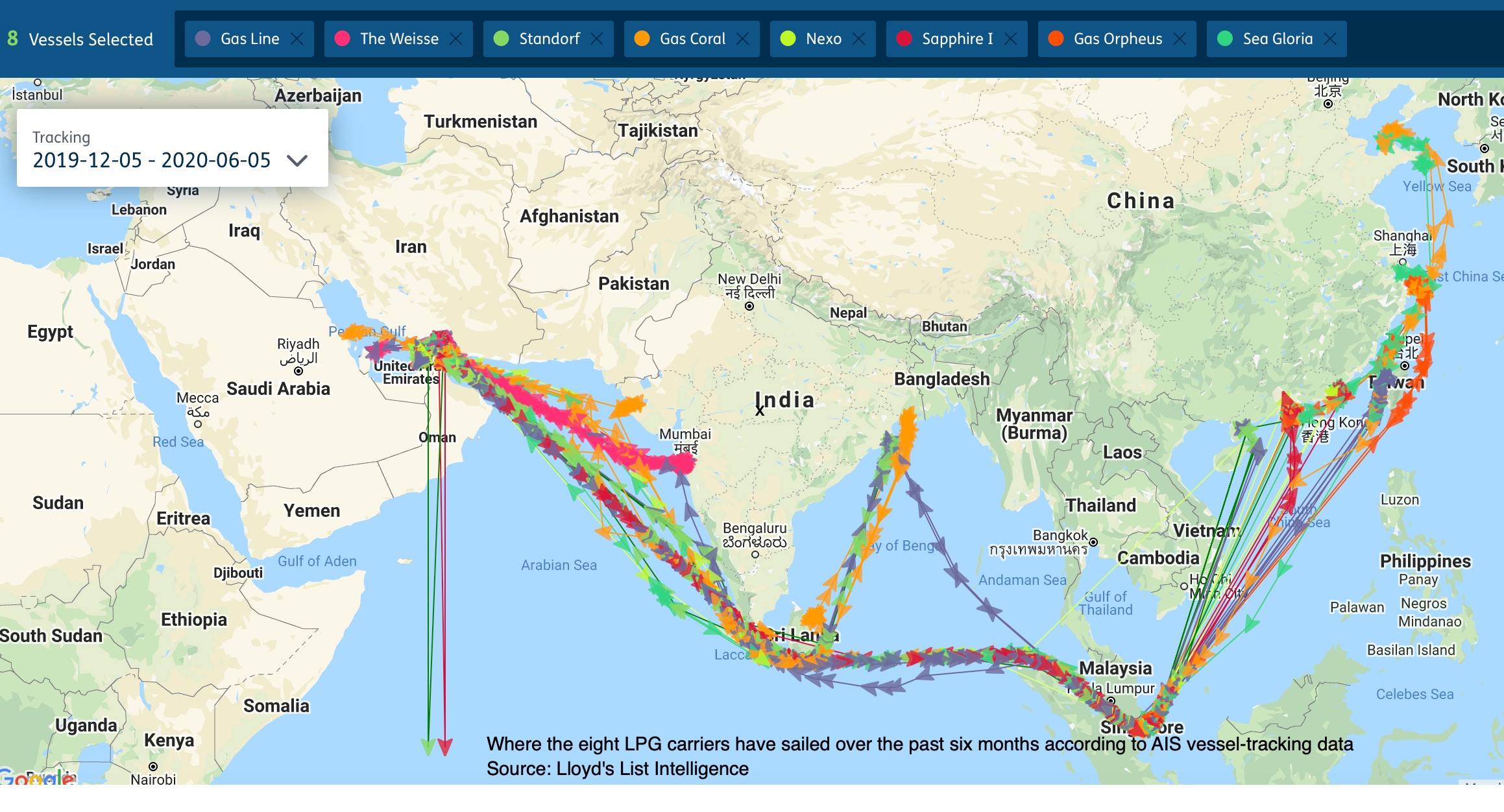Panama-flagged LPG carriers investigated for Iran shipments
The vessels have been tracked shipping liquefied petroleum gas to China and India during the past 12 months
The eight vessels have been tracked shipping liquefied petroleum gas to China and India during the past year. Five under investigation have reflagged to Panama after being deregistered by Liberia
THE maritime authority of Panama is investigating a fleet of eight Panama-flagged liquefied petroleum gas carriers linked to sanctioned Iranian shipments to China and India, and engaged in shipping practices that the US has labelled as “deceptive”.
The authority’s marine chief Rafael Cigarruista said the vessels are being investigated, but he was not able to provide a more detailed response by the time of publication.
Previous investigations have resulted in deregistration because the owners could not satisfy the flag they were not involved in sanctions-busting activities.
All of the vessels may be sailing without liability insurance as they have not been entered with any P&I clubs since coverage stopped in the second half of 2019, according to the Lloyd’s List Intelligence database.
A separate check showed all eight vessels were also not entered in any database operated by the International Group of P&I Clubs — the 13 clubs covering 90% of the world’s international fleet.
One of the LPG carriers, The Weisse (IMO 8818843) was tracked via satellite imagery loading at Iran’s Asaluyeh terminal on November 14, when its Automatic Identification Satellite transponder was turned off, according to information from US-based non-profit group C4ADS.
Lloyd’s List first wrote last June about a fleet of Chinese-owned LPG carriers shipping Iranian LPG to China via a series of ship-to-ship transfers off Malaysia, using the same logistics chain and shipping practices as sanctioned crude shipments.
Six of the eight LPG vessels were previously or currently linked to two beneficial Chinese owners.
These are either Kunlun or the Cosco tanker unit subsidiary, Cosco Shipping Tanker (Dalian) Seaman and Shipmanagement. Both units were sanctioned by the US for a five-month period over September through to January. The LPG carriers were reflagged to Panama from Liberia in late 2019, at the same time as P&I cover was withdrawn.
News that the LPG carriers are still switching off their AIS for periods of time in and around Iranian waters and conducting STS transfers is the first test for the Panama flag’s tough new position on deceptive shipping practices.
The Panama Maritime Authority’s directorate of merchant marine said in a circular last week that it would fine owners $10,000 or deregister them for any gaps in AIS or Long Range Identification Tracking systems.
The move was in response to a global shipping advisory released on May 14 by the US State Department, Treasury Department and US Coast Guard.
AIS gaps or “going dark”, as well as irregular trading patterns and STS transfers were singled out, along with three other deceptive shipping practices, used by ships to obfuscate the destination and origin of sanctioned cargoes.
The new sanctions guidance came as the Trump administration sought to increase pressure on both Venezuelan and Iranian regimes whose energy commodities exports have been crippled by the unilateral sanctions extending more than 18 months.
The vessels that have reflagged and do not have P&I cover include Sapphire I (IMO 9193721), Gas Orpheus (9046784), Nexo (9014456), Sea Gloria (9005053) and Gas Coral (9114581).
C4ADS identified two other Panama-flagged vessels, The Weisse (8818843) and Standorf (8902993) in a separate investigation into Iranian LPG shipments with missing signals. A further Panama-flagged LPG carrier Gas Line (90144420), linked to the same owners, also showed AIS gaps in its transmission in between loading its last two China-bound cargoes within the Middle East Gulf area — between April 12 and April 20 and between May 29 and June 4, Lloyd’s List Intelligence data shows.
The Weisse conducted at least five clandestine voyages from Iran, including one loading while its AIS transponder was off on November 14, satellite images show, according to C4ADS. The cargoes were delivered to an import terminal near Mumbai, according to vessel-tracking data.
Its registered owner is Olddorf Shipping, with technical and ISM managers listed as Gas Master Shipping, according to the Lloyd’s List Intelligence database. The latter’s address is c/o Istanbul-based TGM Deniz Isletmeciligi ve Acenteligi. Gas Line and Standorf are also linked to the same Turkish company, according to the Lloyd’s List Intelligence database and the C4ADS investigation.
The other five LPG carriers have a more complicated ownership chain. The vessels reflagged and changed ownership at the same to a series of unknown single-registry Panamanian companies. Emirates-based Waves Shipping Line FZE is providing ISM management for three of the carriers. China Cosco Shipping is showing as the beneficial owner for the Gas Orpheus, although the registered owner, technical and ISM manager changed in August 2019.
Sea Gloria has also been managed by Waves Shipping Line since February 2020. China Cosco Shipping was listed as the beneficial owner from August 2019 to January 2020 before the vessels ownership changed, along with the registered owner, which is now an emirates shelf company in Dubai.
C4ADS said it was also investigating other LPG carriers involved in Iran–Pakistan trade routes as well as those shipping to India and China. One of these was flagged in Panama and another in Sierra Leone.
So called flag-hopping was another practice identified by the US as a sign of deceptive or illicit shipping practices. A further two LPG carriers were reflagged to Belize and remain uninsured in addition to the eight Panama-flagged ships. The Wiesse, Gas Line and Standorf have all been flagged with Panama for longer periods beyond the imposition of US sanctions on Iran.



